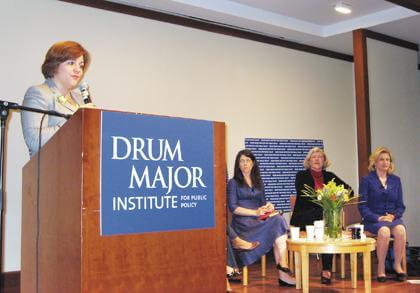By Alex Christodoulides
Three women trailblazers, among them a Queens congresswoman, spoke Monday about their view of the road ahead for women and said the sexes still are not equal.
From the vantage point of City Council Speaker Christine Quinn (D-Manhattan), former U.S. Rep. Pat Schroeder (D-Colo.) and U.S. Rep. Carolyn Maloney (D-Astoria), the title of Maloney's new book, "Rumors of Our Progress Have Been Greatly Exaggerated," is unfortunately the case.
Quinn is the first female and first openly gay City Council speaker, while Schroeder was the first woman elected to Congress from Colorado.
Quinn said Maloney, a former city legislator, had been the first woman to have a baby while in City Council, stressing that things had changed, but there is still a ways to go.
"This year, two women in City Council have had babies. And one of them isn't even married," Quinn said in a tone calculated to make the mostly female audience laugh.
Maloney sees many things in society that she believes hold women back, like lower wages and fewer opportunities at work for women with families.
"Women have not made gains. The pay gap is solid — it's like trying to change George Bush's mind. And in management it's even worse, it's entrenched," Maloney said. "We live in a country where we can't pass the Equal Rights Amendment, which says that you shouldn't discriminate against anyone because of their sex. How threatening is that?"
Her book was published in May by Modern Times.
Schroeder, who left Congress in 1996, faced blatant sexism while in office, such as when she was tapped to serve on the House Armed Services Committee as the only woman.
"They gave me half a chair because they thought my vote should count half as much because I'm a girl," she said. Thirteen of 62 current members of that committee are women.
She is now president and CEO of the American Association of Publishers.
Quinn, Maloney and Schroeder were participants Monday in a book discussion panel at New York University organized by the Drum Major Institute, a nonprofit, nonpartisan think tank, about women's equality. The panel also included Diana Salas, the Women of Color Policy Network's associate director; Olga Vives, the National Organization for Women's executive vice president; and Lisa Witter, chief operating officer of the public interest communications firm Fenton Communications.
"I think women today don't understand how far we've gotten and how far behind we are," Vives said. "Women don't achieve equality in this country without being equal economically. Money is very important. We'll never get to be 50-50 without that."
All the speakers mentioned women's status as half of the population despite the hurdles they face.
Witter, author of the "The She Spot: Why Women Are the Market for Changing the World — And How to Reach Them," published this month by BK Business, said she wants to see the idea of women as a narrowly defined special interest group end.
"Part of the reason I wrote my book is because I want women to ditch the niche that women are some special interest," she said, and mentioned that at least one male politician she has spoken to assumed the only issue for women is reproductive choice. "We've got to push harder, we've got to be more visible."
One way to speak up is to give money to politicians who work for issues that help women.
"Even if she's not viable [as a candidate], we should give her money," Salas said.
"We have a Women's Caucus in Congress, and a lot of times Republican and Democratic women agree [on issues]," Maloney added. "Sometimes it's better to support somebody who's going to push your agenda."

































